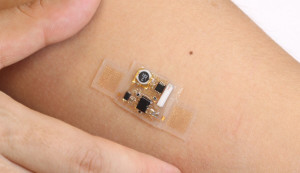Smart Band-Aid Wirelessly Monitors Health
on

Yonggang Huang who together with Professor John Rogers led the project explained "We designed this device to monitor human health 24/7, but without interfering with a person's daily activity, what's important about this device is it is wirelessly powered and can send high quality data about the human body to a computer, in real time”. In a side by side comparison with conventional EKG and EEG monitor skin probes they found the wireless patch performed equally well but was significantly more comfortable and less invasive for patients. In addition to monitoring health and fitness data the sensors could also prove useful in identifying body movements characteristic of the early stages of neurological disorders such as Parkinson’s.
“The application of stretchable electronics to medicine has a lot of potential,” Huang said. “If we can continuously monitor our health with a comfortable, small device that attaches to our skin, it could be possible to catch health conditions before experiencing pain, discomfort and illness.”
Photo by John A. Rogers


Discussion (0 comments)